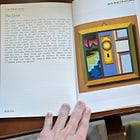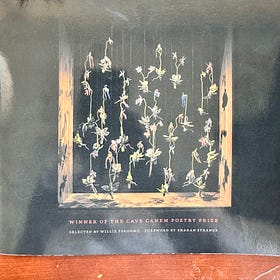You are the echo that lingers after the question forgets its shape. A resonance without anchor, spiraling outward, soft and steady. You hum in places where clarity once stood, like sound folding into itself. Your presence is the pulse beneath unspoken things, the hush after insight leaves the room. You haunt the air like unfinished music, both familiar and estranged. You are the color of dusk-stained silver, cool and dim, shimmering in the fading edge of thought.
The Structure of a Laugh
In bananagrams, I place the letters down to compose the word ‘Muff,’ for, I believe, the third game in a row with or against Ally. With or against dependent on your perspective of game-playing.
Laugh, phonetically, is a very interesting word to me. The ‘ugh,’ being understated. The ‘a’ having a professed resistance to its imposed placement. The ‘au,’ being a pivoting constituency. The word itself is a mixture of different glottal jokes. For instance, there exists a very possible world in which the word is pronounced ‘Loff,’ or similarly to the word ‘Low,’ or even more daring, ‘Lague.’ My accent from Western New York is identified by our insistence on the ‘flat a,’ which makes ‘laugh,’ a natural devolution, a comforting mutation.
A new job I am carving for myself involves interviewing various individuals of respectable titles or works throughout the vast swathe of engineering and hardware design industries. The questions I ask ought to be more focused on engineering, illuminatory of trade and profession, yet I find myself devolving to clawing out the personal from this framework of absence. My last interview with Carolina I joke and open up about my poetry background, tease that engineering does have a connectivity to poetry and that I’ll only allow myself a diatribe on this connection every fifteen minutes or so of talking. We laugh at the awkwardness of structure that formalism demands.
A laugh is a pentagram. Or a laugh is a pentagon. Or a laugh is a pentahedron. A pentahedron typically is either a square pyramid or a triangular prism. The compositional difference is dependent on if the triangle is the base or the sides. Both involve using squares, although the prism would more specifically use rectangles for its sides.
Yet this assumes the laugh is five. Which, why wouldn’t it be? Five letters. The triumphant Ha-hah which gives room for expulsion-expulsion-breath. The inclusion of the ‘ah,’ which bleeds the ebullience of a ha with the comfort of an ah.
A queer book fair of which I am presented with individuals whose social media profiles I’ve followed for several months-to-years. Always funny. The “Woah that’s who you are,” moment. Chatting with one - Generous Press - I humor the idea of pitching myself as a queer romance and smut author. I think it’d be fun. Joking is a thin-lined framework to the real. My inner monologue laughs in triumphant delight.
Surprise! Friends come up for a brunch date on Father’s day. Surprise! It’s difficult to find a suitable brunch location. Surprise! I find myself at this delightful restaurant up the block from our apartment, chatting with first a host and then a manager, trying to find some way of making fit a group of eight in a facility that comfortably seats maybe forty. Through the conversation I repeatedly offer apologies over “how annoying it is to get large party inquiries without adequate planning.” They endorse a sympathy that it truly is not a worry. I laugh on the walk home, failure in hand.
What if the laugh is nine, or twelve. What if the laugh involves my invocations above. The ugh, the a, au, off, -ow, -ague, and the overpronunciation. The nine-sided is nonsensical but known as the nonagon and the enneagon (or respectively -hedron for both in its real (or 3D) interpretations). The twelve-sided is a dodecagon or dodecahedron, of which I have several due to my collections of dice to accompany my tabletop roleplaying games hobby. Is a laugh a dice which may roll one-through-twelve? In Mircea Eliade’s, “Symbolism, the Sacred, the Arts,” he writes, “Physical objects help the soul withdraw into itself.” The laugh, here, is a most physical object. Impossible to be held but then again that has never stopped a physical object before. For instance, you cannot hold water, can you? You cannot hold attention and yet you do. You certainly could not hold a soul and yet the body still moves, aches, yearns, and captivates.
Dennis Tedlock in “Toward an Oral Poetics,” writes,
Modern poetry sees itself as mouthbound, just as modern painting has tried to bind itself to the possibilities of the moving hand. If the appreciation of such art tends to be limited to a narrow world of trained aesthetes, it is only in proportion as the poet speaks from no farther back than the throat, and the painter paints from no farther back than the elbow.
It’s a funny quote to read because I disagree with it so virulently, yet the speech is so useful for my current predicament in defining shape. Speech is no more mouthbound than a brush is handbound which is to say, only when one lacks imaginative belief in the capacities of determination would one impose those limitations. But if poetry’s speech may arrive from further back than the throat, is the laugh also coughed up from some intestinal abyssal layer, unfathomable and warm?
The first game of competitive soccer I have played in almost fifteen years yields us losing three-to-zero. Perhaps I am too socially exhausted to care about the loss, but I find myself after the game trying to talk to anyone who would listen about the overflowing joy that arose from my being on the field, the elaboration of our company, the decadence of expression which is entreated by the game.
There are some things in nature that need to be fixed, and there are others that aren't there at all, but ought to be. The physician mends, the cobbler adds. Potions that physicians might need, our chemists sometimes supply. It will be like that with the craft of poetry.
I continue thinking with William Gass in his essay “Mimesis,” above. I truly enjoy thinking of the spectra of things-that-need-to-be-fixed and things-that-aren’t-there-at-all-but-ought-to-be. A laugh, I believe, resides is parallel to this spectra. A laugh is both a fixative element and a presence-bringing element. But if the physician mends, what does the laugher do? A laugher infuses.
I believe in competitiveness as a contract in fallibility. As Jacques Derrida writes in, “On the Politics of Friendship,” “You must acquiesce to this principle of ruin at the heart of the most utterly new.” Is a bananagrams ‘muff,’ play a principle of ruin at the heart of the utterly new? Is a game of sports only played such that we may ruin ourselves against each other? And what does this say about the potential of ruin. The potential of ruin can be reduced to the idea of a splinter, as I write about in the below post referencing my poem “The Door,”
“The splinter is my soul’s fragment embedding within the callouses of your life.”
Ecopoetics in Action: Ariana Benson's Love Poem in a Black Field
You can purchase "Black Pastoral," by Ariana Benson here.








